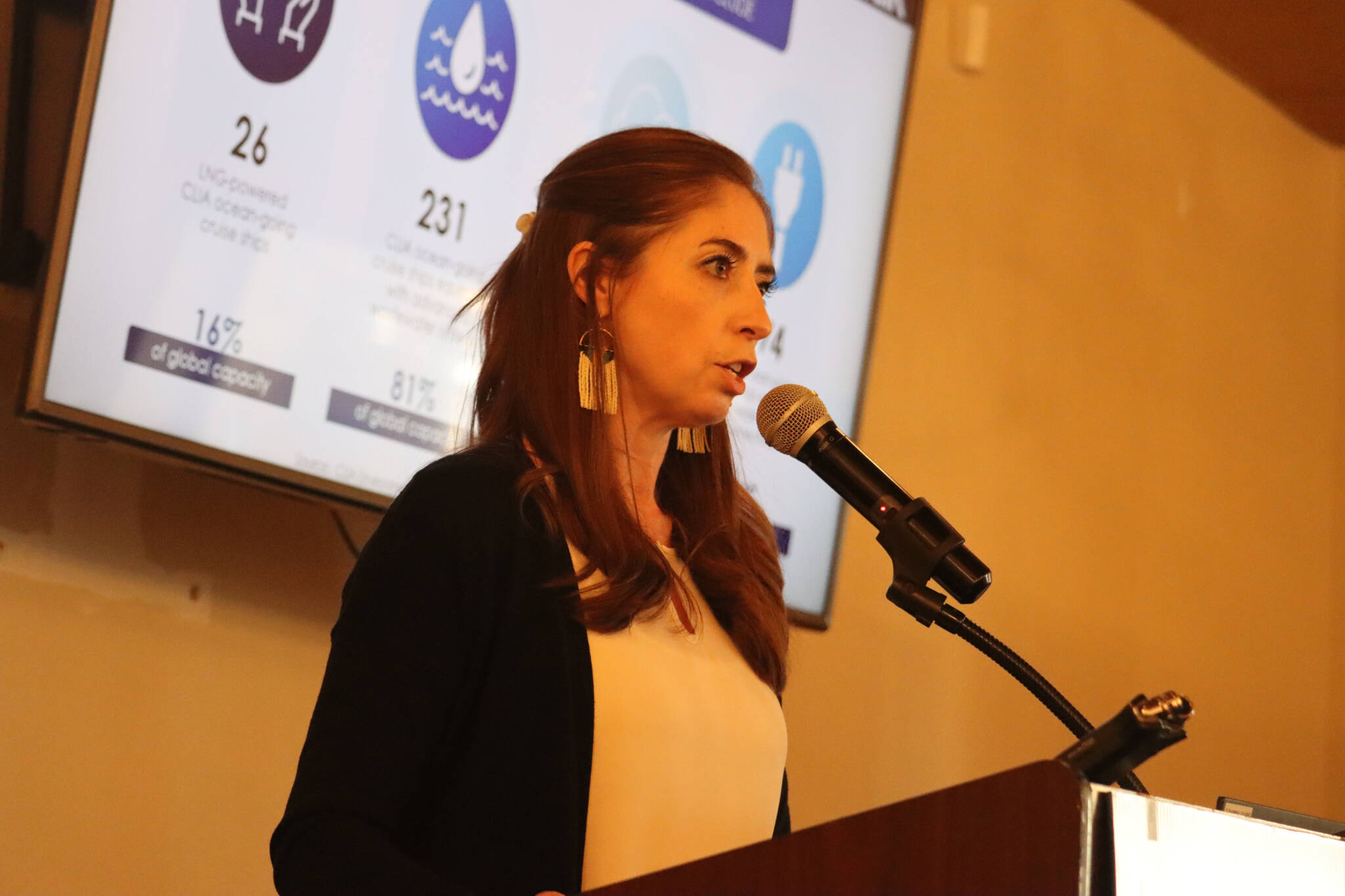Las year was a pivotal year for the cruise lines, according to Lanie Downs, senior director of community relations and public affairs for Cruise Lines International Association Alaska. With nearly all docks around the world opening up, it gave the industry a chance to return to being fully operational after the pandemic.
That’s a development that was felt locally, and Eric Forst, a Greater Juneau Chamber of Commerce board member and past president, said the financial impact industry has on Alaska’s capital city can’t be overstated.
“It is our largest contributor to our city’s sales tax revenue, it’s over 20% of the revenue that the city gets, it’s all from cruise ship sales tax from passengers and they come and bring a lot of money here and they’re great ambassadors for our community,” Forst said.
The Greater Juneau Chamber of Commerce welcomed guest speaker Downs on Thursday to the Juneau Moose Family Center to discuss the cruise industry and its likely effects on Juneau’s economy in the coming year.
Downs started her presentation by reaffirming the trade group’s commitment to sustainability by addressing environmental initiatives that the industry is currently involved in. Downs said the industry continues to see huge investments being made with the average age of the fleets decreasing with a large number of retiring vessels that are being replaced by better ships equipped with the best environmentally friendly technology. Downs said that many cruise lines are also working to increase the number of ships with wastewater treatment systems on board, along with exhaust gas cleaning systems and shoreside power.
Downs said cruise ships are working to improve environmental priorities on shore, too.
She said Holland America Princess recently partnered with the Denali Borough and others to create the Denali Borough Community Recycling program. The program consists of increasing the presence of recycling bins around the borough so visitors, residents and lodges could better work toward improving recycling to avoid the negative impacts often associated with cruises. According to Downs, it’s been, “Quite impressive what they’ve been able to do.”
Additionally, Downs shared a 2017 report released by McKinley Explore, that stated before COVID-19, tourism was one of the only growing sectors in Alaska. In looking at the economic impact statewide, Downs said the industry overall had created 52,000 jobs and 1.5 billion in payroll. In a 2016 McKinley report specifically for Juneau, cruise passengers on average spent $162 per visit.
The capacity of the ships that called on Juneau last year was 1.5 million, and Downs said the number of passengers visiting Juneau last year was close to 1.2 million, with ships roughly 74% full in 2022. Downs said that in an earnings report for 2023, cruise lines are projecting their ships to run at 90% full in the first quarter of the year, which Downs said is a good indication that the industry is getting back on track. The number of cruise tourists coming to Juneau for 2023 could be as high as 1.6 million. Though Downs said she’s uncertain whether that number will be reached this year, capacity and bookings are looking positive.
“I think if we look at the overall season and what contributes to those numbers, the season has really expanded,” Downs said. “We have ships coming here in early April, we’re seeing more bigger ships in some cases, so we’re now looking at a 27-week season, whereas before a full season was 20 to 22 weeks. Some ships come in during early April and then don’t leave until late October, so that adds into those numbers but it’s over a longer season, which hopefully leaves less of an impact.”
The first ship of the season, the Norwegian Bliss, is expected to arrive in Juneau on April 17, according to CLIA’s port schedule.
Downs also said CLIA is committed to being “good community partners” as the City and Borough of Juneau continues to make progress on adopting recommendations from a visitor industry task force. Some of those recommendations include more transparency with ship scheduling, eliminating offloading of waste so as to avoid contributing to the Juneau landfill, limit drinking water purchases during drought conditions, provide letters of support for CBJ’s application for Federal RAISE grants for shoreside electricity, eliminating the use of large video screens when in port and invisible to neighborhoods, maximizing localism, and supporting up to $10 million of passenger fees for the Centennial Hall expansion.
Downs closed by reiterating that cruise line recovery is looking strong. She said that while certain factors could impact 2023, as of current information based on public reports, things are looking on track for a full recovery by mid-summer. Also, longer booking windows that Juneau is more accustomed to are returning after COVID, which Downs said allows businesses and residents an opportunity to plan and anticipate what to expect in terms of cruise passengers.
“Really, it’s just a matter of the economy, and where are people going to be spending their money, or can they spend money,” Downs said. “Right now, overall, it’s looking really good in general, not just for cruises, but things are looking good, people are spending money. There’s a demand for travel, but it’s true that we never do know what’s coming. Right now, there’s the wave of COVID hitting Asia and Europe, and so that impacts people’s decisions, but ultimately, I think Alaska is viewed as a safe destination, even if we were to have a surge in COVID again.”
• Contact reporter Jonson Kuhn at jonson.kuhn@juneauempire.com.

